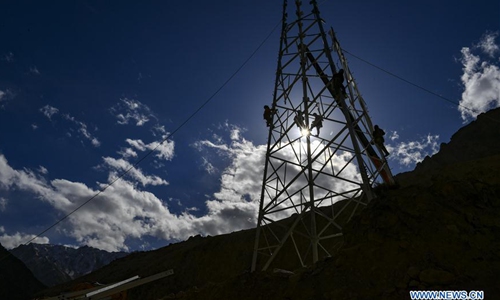SOURCE / INDUSTRIES
China to accelerate infrastructure investment to rev up GDP

Technicians work on an electric transmission tower in Maryang Township, Tajik Autonomous County of Taxkorgan, northwest China's Xinjiang Uygur Autonomous Region, Nov. 23, 2019. (Xinhua/Hu Huhu)
China is accelerating infrastructure investment to cushion the economic blow of the coronavirus. Central government departments are accelerating projectsassessment and approval, while local governments are mapping out trillions of yuan worth of investment plans, according to media reports.Such large investment, though carrying risks, should be the most effective way to offset the economic impact from the virus, and is likely to bolster GDP by 1-1.5 percent this year, one Chinese economist told the Global Times on Thursday.
China's construction-related shares surged on Thursday, with shares of Fujian Cement surging by more than 6 percent and those of state-owned machinery giant XCMG rising by more than 3 percent.
According to the Economic Information Daily on Thursday, several government departments are mounting efforts to expand infrastructure investment. Such efforts include speeding up project approvals, inviting bids and pushing production resumption.
A number of key projects have been launched. On Monday, the China Three Gorges Corp announce it was kick-starting 25 new-energy projects with an input of 58 billion yuan ($8.27 billion), which are collectively expected to generate 17,000 jobs.
A government official from the Ministry of Transport disclosed that China will initiate a flurry of infrastructure projects "ahead of schedule." The official disclosed that key railway projects have a work resumption rate of 38.9 percent, while civil airport projects have a rate of 25.9 percent.
Provincial governments have also rushed to roll out heavy investment plans. Central China's Henan Province plans to invest a lofty 3.3 trillion yuan in 1,000 projects; Southwest China's Yunnan Province is planning 3.6 trillion yuan worth of infrastructure investments; and Beijing is looking to invest 252.3 billion yuan in 300 infrastructure, social welfare and high-tech projects.
Ye Hang, a professor at the College of Economics of Zhejiang,said that among the three major propellers of GDP growth, ratcheting up capital investment is the most expedient way, if the government approves a big stimulus, as exports are now shadowed by uncertainties in China-US relations, and consumption is burdened by an employment decline because of the epidemic.
"Hefty government-led investment is likely to cause side-effects like elevating inflation, but I figure that's the only efficient way to wipe out the negative impact of the coronavirus on the Chinese economy in a short time, say, half a year, under the premise that the epidemic can be contained soon," Ye said.
He predicted this round of government spending could bolster China's GDP growth by 1-1.5 percent and push China's GDP to 5.5 percent rise in 2020, a level of growth anticipated by some economists before the coronavirus outbreak.



